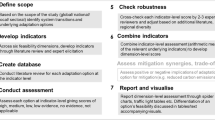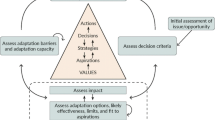Abstract
The frequently heard call to harmonize adaptation and mitigation policies is well intended and many opportunities exist to realize co-benefits by designing and implementing both in mutually supportive ways. But critical tradeoffs (inadequate conditions, competition among means for implementation, and negative consequences of pursuing both simultaneously) also exist, along with policy disconnects that are shaped by history, sequencing, scale, contextual variables, and controversial climate discourses in the public. To ignore these issues can be expected to undermine a more comprehensive, better integrated climate risk management portfolio. The paper discusses various implications of these tradeoffs between adaptation and mitigation for science and policy.

Similar content being viewed by others
Notes
The author thanks an anonymous reviewer for pointing out this potential challenge.
References
Adger WN, Agrawala S, Mirza MMQ, Conde C, O’Brien K, Pulhin J, Pulwarty R, Smit B, Takahashi K (2007) Assessment of adaptation practices, options, constraints and capacity. In: Parry ML, Canziani OF, Palutikof JP, van der Linden PJ, Hanson CE (eds) Climate change 2007: impacts adaptation and vulnerability contribution of Working Group II to the Fourth Assessment Report of the Intergovernmental Panel on Climate Change. Cambridge University Press, Cambridge, pp 717–743
Australian Department of Climate Change (2010) Adapting to climate change in Australia: an Australian Government Position Paper. Commonwealth of Australia, Canberra
Bedsworth L, Hanak E (2008) Preparing California for a changing climate. PPIC, San Francisco
Biesbroek GR, Swart RJ, van der Knaap WGM (2009) The mitigation-adaptation dichotomy and the role of spatial planning. Habitat Int 33(3):230–237
Binder LW (2009) Community engagement and addressing barriers to adaptation. National Estuarine Research Reserve Coastal Training Program “Planning for Climate Change”, NOAA NERR. http://www.nerrs.noaa.gov/Doc/video/p5/index.html
Bowman TE (2009) A turning point in climate change communication priorities. Int J Sust Comm 4:64–77
Brody S, Grover H, Lindquist E, Vedlitz A (2010) Examining climate change mitigation and adaptation behaviours among public sector organisations in the USA. Local Environ 15(6):591–603
Bulkeley H, Betsill M (2005) Rethinking sustainable cities: multilevel governance and the ’urban’ politics of climate change. Env Polit 14(1):42–63
Cash DW, Adger WN, Berkes F, Garden P, Lebel L, Olsson P, Pritchard L, Young O (2006) Scale and cross-scale dynamics: governance and information in a multilevel world. Ecol Soc 11:8. http://www.ecologyandsociety.org/vol11/iss12/art18/
Council on Environmental Quality (CEQ) (2010) Progress report of the Interagency Climate Change Adaptation Task Force: recommended actions in support of a National Climate Change Adaptation Strategy. The White House, Washington
Escobar JC, Lora ES, Venturini OJ, Yáñez EE, Castillo EF, Almazan O (2009) Biofuels: environment, technology and food security. Renew Sustain Energy Rev 13(6–7):1275–1287
Gardner J, Parsons R, Paxton G (2010) Adaptation benchmarking survey: initial report. CSIRO Climate Adaptation Flagship Working Paper No 4. CSIRO Climate Adaptation Flagship, Kenmore
Holdren J (2008) Science and technology for sustainable well-being. Science 319:424–434
Kahan D (2010) Fixing the communications failure. Nature 463:296–297
Kahan DM, Braman D (2006) Cultural cognition and public policy. Yale Law Pol Rev 24:147–170
Kingdon JW (2002) Agendas, alternatives, and public policies. Addison-Wesley Longman Publ, White Plains
Klein R, Sathaye J, Wilbanks T (2007a) Challenges in integrating mitigation and adaptation as responses to climate change. Mitig Adapt Strategies Glob Chang 12:639–962
Klein RJT, Huq S et al (2007b) Inter-relationships between adaptation and mitigation. In: Parry ML, Canziani OF, Palutikof JP, van der Linden PJ, Hanson CE (eds) Climate change 2007: impacts, adaptation and vulnerability. Contribution of Working Group II to the Fourth Assessment Report of the Intergovernmental Panel on Climate Change. Cambridge University Press, Cambridge, pp 745–777
Kwadijk JCJ, Haasnoot M, Mulder JPM, Hoogvliet MMC, Jeuken ABM, van der Krogt RAA, van Oostrom NGC, Schelfhout HA, van Velzen EH, van Waveren H, de Wit MJM (2010) Using adaptation tipping points to prepare for climate change and sea level rise: a case study in the Netherlands. Wiley Interdiscip Rev: Clim Change 1(5):729–740
Leiserowitz A (2005) American risk perceptions: is climate change dangerous? Risk Anal 25:1433–1442
Leiserowitz A, Maibach E, Roser-Renouf C (2010) Global warming’s six Americas, January 2010. Yale University. Yale Project on Climate Change, New Haven
Martens P, Chang CT (eds) (2010) The social and behavioural aspects of climate change: linking vulnerability, adaptation and mitigation. Greenleaf Publishing, Sheffield
Moser SC (2009) Good morning, America! The explosive US awakening to the need for adaptation. California Energy Commission, Sacramento. http://www.csc.noaa.gov/publications/need-for-adaptation.pdf
Moser SC (2010a) Communicating climate change: history, challenges, process and future directions. Wiley Interdiscip Rev: Clim Change 1:31–53
Moser SC (2010b) Costly knowledge—unaffordable denial: the politics of public understanding and engagement on climate change. In: Boykoff MT (ed) The politics of climate change. Routledge, Oxford, pp 161–187
Moser SC, Ekstrom JA (2010) A framework to diagnose barriers to climate change adaptation. Proc Natl Acad Sci 107(51):22026–22031. www.pnas.org/cgi/doi/10.1073/pnas.1007887107
National Research Council (2010a) America’s climate choices: adapting to the impacts of climate change. National Academies Press, Washington
National Research Council (2010b) America’s climate choices: advancing the science of climate change. National Academies Press, Washington
National Research Council (2010c) America’s climate choices: limiting the magnitude of future climate change. National Academies Press, Washington
Naylor RL, Liska AJ, Burke MB, Falcon WP, Gaskell JC, Rozelle SD, Cassman KG (2007) The ripple effect: biofuels, food security, and the environment. Environment 49(9):31–43
Neufeldt H, Jochem E, Hinkel J, Huitema D, Massey E, Watkiss P, McEvoy D, Rayner T, Hof A, Lonsdale K et al (2010) Climate policy and inter-linkages between adaptation and mitigation. In: Hulme M, Neufeldt H (eds) Making climate change work for us: European perspectives on adaptation and mitigation strategies. Cambridge University Press, Cambridge, pp 3–30
Parry M (2009) Closing the loop between mitigation, impacts and adaptation. Clim Change 96(1):23–27
Preston BL, Westaway RM, Yuen EJ (2011) Climate adaptation planning in practice: an evaluation of adaptation plans from three developed nations. Mitig Adapt Strateg Glob Chang 16(4):407–438. doi:10.1007/s11027-010-9270-x
Rayner T, Jordan A (2010) Adapting to a changing climate: an emerging European Union policy? In: Jordan A, Huitema D, Van Asselt H, Rayner T, Berkhout F (eds) Climate change policy in the European Union: confronting the dilemmas of mitigation and adaptation? Cambridge University Press, Cambridge, pp 145–166
Smith MS, Horrocks L, Harvey A, Hamilton C (2011) Rethinking adaptation for a 4°C world. Phil Trans R Soc A 369:196–216
Tilman D, Socolow R, Foley JA, Hill J, Larson E, Lynd L, Pacala S, Reilly J, Searchinger T, Somerville C, Williams R (2009) Beneficial biofuels: the food, energy, and environment trilemma. Science 325:270–271
Tompkins EL, Adger WN, Boyd E, Nicholson-Cole S, Weatherhead K, Arnell N (2010) Observed adaptation to climate change: UK evidence of transition to a well-adapting society. Glob Environ Change 20(4):627–635
Venema HD, Rehman IH (2007) Decentralized renewable energy and the climate change mitigation adaptation nexus. Mitig Adapt Strateg Glob Chang 12(5):875–900
Walsh C, Hall J (2008) Sustaining knowledge for a changing climate (SKCC), Theme 2: Linking adaptation and mitigation strategies. Project theme description, EPSRC/UKCIP
Warren R (2011) The role of interactions in a world implementing adaptation and mitigation solutions to climate change. Phil Trans R Soc 369:217–241
Webster B, Riddell P (2009) Global warming is not our fault, say most voters in times poll. http://www.timesonline.co.uk/tol/news/environment/article6916648.ece
Wilbanks TJ (2005) Issues in developing a capacity for integrated analysis of mitigation and adaptation. Environ Sci Policy 8(6):541–547
Wilbanks TJ, Kane SM, Leiby PN, Perlack RD, Settle C, Shogren JF, Smith JB (2003) Integrating mitigation and adaptation: possible responses to global climate change. Environment 45(5):30–38
Wilbanks TJ, Sathaye J, Klein RJT (2007) Introduction to the special issue entitled “Challenges in Integrating Mitigation and Adaptation as Responses to Climate Change”. Mitig Adapt Strateg Glob Chang 12(5):639–641
Yohe G (2001) Mitigative capacity: the mirror image of adaptive capacity on the emissions side. Clim Change 49:247–262
Yohe G, Strzepek K (2007) Adaptation and mitigation as complementary tools for reducing the risk of climate impacts. Mitig Adapt Strateg Glob Chang 12(5):727–739
Author information
Authors and Affiliations
Corresponding author
Additional information
This essay by Susanne Moser is a revised version that supercedes her Springboard Editorial that temporarily appeared as an online publication. This earlier version commented on a paper that was subsequently withdrawn by the author, though not for substantive reasons. This Essay expresses Susanne Moser’s own point of view on the topic.
Rights and permissions
About this article
Cite this article
Moser, S.C. Adaptation, mitigation, and their disharmonious discontents: an essay. Climatic Change 111, 165–175 (2012). https://doi.org/10.1007/s10584-012-0398-4
Received:
Accepted:
Published:
Issue Date:
DOI: https://doi.org/10.1007/s10584-012-0398-4




